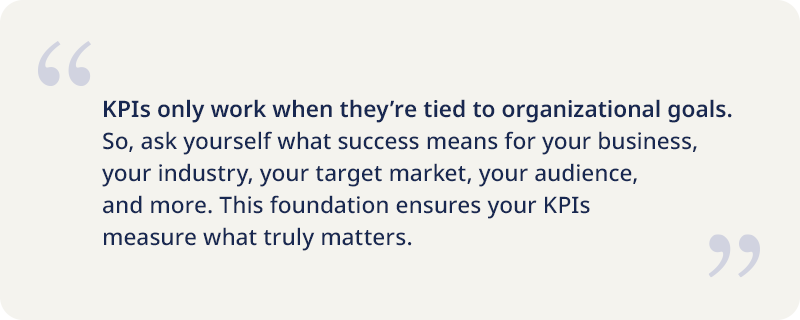Key Takeaways
- A combination of meaningful KPIs focused on your organization’s needs is critical for fueling strong financial performance.
- KPIs transform abstract goals into measurable outcomes, enabling you to track progress, align team efforts, and make data-driven decisions.
- Comparing your KPIs with industry benchmarks and past performance can help you compare across industry standards.
Clear visibility into how your organization is performing is the foundation of decision-making. In fact, 93% of business leaders believe having the right type of data intelligence can directly impact the success — or failure — of their business.
But here’s the reality: business leaders are overwhelmed by the sheer amount of data at their fingertips. Over 70% say the incredible volume of data, and their lack of trust in the data itself keeps them from making strong decisions.
Often, we see businesses track abstract goals like growth, performance, or revenue. But, not attaching your metrics to actual measurable data keeps you from accountability, action, and success.
That’s where Key Performance Indicators (KPIs) come in. By establishing clear, relevant, and measurable KPIs, you ensure every business decision is grounded in concrete data. KPIs provide the critical lens you need to strengthen financial performance.
And the results are significant. Business leaders who use data to drive decisions are 23 times more likely to acquire customers, six times more likely to retain customers, and are ultimately almost 20% more profitable.

Best Practices for Choosing KPIs
When selecting KPIs, consider the following best practices:
- Start with your strategic objectives
- Determine how you'll measure your KPIs
- Focus on what’s most critical to avoid information overload
- Implement technology to track and visualize KPIs, ensuring it aligns with your organization's needs
The key is not just tracking these metrics but understanding how they interact and what their movements tell you about the strategic adjustments you should be making.
- Watch this webinar on key performance indicators, benchmarking, and strategic growth strategies for more on how KPIs can impact your organization.
Identifying Core Financial Performance Metrics
There are several different KPIs worth measuring. However, in our client work, we have seen a strong tie between financial performance metrics and overall business success.
Here are a few to consider:
Financial Liquidity and Efficiency Metrics
- Current Ratio:
- Why it’s important: Trends in this ratio can signal needed changes in working capital management or indicate opportunities for reinvestment.
- Added benefits: This data helps businesses decide on adjusting credit terms, securing additional financing, or reallocating resources to improve cash flow.
- Total Asset Turnover:
- Why it’s important: This highlights opportunities for strategic asset reallocation or the need for technological upgrades to improve productivity.
- Added benefits: This data helps optimize asset utilization, expand capacity, and highlights potentially underperforming assets.
- Cash Conversion Cycle:
- Why it’s important: This metric informs collection processes, negotiating supplier terms, and optimizing inventory operations.
- Added benefits: Combines Days Sales Outstanding, Days Payable Outstanding, and inventory metrics to showcase opportunities to boost efficiency.
- Days Cash on Hand:
- Why it’s important: This metric influences decisions about investments, expansion, and operational reserves.
- Added benefits: It helps businesses determine when to increase cash reserves, reduce debt, or take on new investments.
Growth and Profitability Indicators
- Gross Profit Margin Trends:
- Why it’s important: Changes in this metric can signal the need for pricing strategy adjustments or cost structure improvements.
- Added benefits: This metric can help with revised pricing models, negotiating supplier contracts for improved profitability.
- Return on Invested Capital (ROIC):
- Why it’s important: This information helps evaluate the effectiveness of strategic investments and capital allocation decisions.
- Added benefits: It guides decisions on optimizing capital investments, divesting underperforming assets, or pursuing new growth opportunities.
- Revenue Growth Rate vs. Industry:
- Why it’s important: This data gives context into organizational performance and identifies how you’re positioned against your competition.
- Added benefits: This information provides insight into industry competition and can help you adjust market strategies and refine product offerings.
Non-Financial Metrics with Financial Impact
Financial metrics are not the only KPIs to consider. Some of the most effective metrics blend financial and non-financial data to fit industry-specific standards for success.
- Learn more about how operational analytics can help your business achieve optimal performance.
Human Capital Metrics
- Employee Lifetime Value (ELTV):
- Why it’s important: This metric gives visibility into recruitment, retention, training, and compensation of your workforce.
- Added benefits: ELTV combines cost-per-hire, productivity metrics, and retention rates to show the true financial impact of human capital investments.
- Revenue Per Employee (RPE):
- Why it’s important: This metric indicates workforce productivity.
- Added benefits: This data can help with streamlining operations, adjusting headcount, investing in employee training, re-evaluating roles and responsibilities, and improving technology.
- Training ROI:
- Why it’s important: This information allows you to decide which training programs are most valuable and discontinue those that are not.
- Added benefits: This metric measures the financial return on employee development investments, helps optimize training budgets, and provides insight into development plans based on employee needs.
- Turnover Cost Impact:
- Why it’s important: This metric gives visibility into workplace culture, hiring processes, and retention versus replacement expenses.
- Added benefits: This data can help calculate the financial burden of employee churn, including recruitment, training, and productivity losses.
Customer-Related Metrics
- Customer Lifetime Value (CLTV):
- Why it’s important: This metric helps you prioritize customer segments, leading to more informed marketing decisions.
- Added benefits: It guides decisions on pricing, upselling, cross-selling, and improving customer experiences to maximize long-term profitability.
- Customer Acquisition Cost (CAC):
- Why it’s important: This data identifies factors driving attrition, retention strategies, and customer experiences to reduce turnover.
- Added benefits: This data informs decisions on resource allocation, product or service enhancements, and balancing the cost of retaining customers versus acquiring new ones.
- Customer Churn Rate and Cost:
- Why it’s important: Identifies factors driving attrition, retention strategies, and customer experiences to reduce turnover.
- Added benefits: Informs decisions on resource allocation, product or service enhancements, and balancing the cost of retaining customers versus acquiring new ones.
Operational Efficiency Metrics
- Capacity Utilization Rate:
- Why it’s important: This metric informs decisions on capital investments, workforce planning, and adjusting pricing or demand strategies.
- Order Fulfillment Cycle Time:
- Why it’s important: Paying careful attention to this metric allows you to reduce lead time to better meet customer expectations.
- Added benefits: Understanding order fulfillment cycle time helps identify supply chain issues, streamline operations, and enhance customer satisfaction.
- Quality Metrics:
- Why it’s important: Metrics like defect rates or error rates can highlight cost impact and customer retention areas of improvement.
The Importance of KPIs
KPIs are like a scorecard for your business. They help you understand your current state, and how to optimize it for future opportunities. And in a world full of data overwhelm, KPIs are a great way to understand how your business is performing against the competition and turn data into actionable insight.
We can help you get clarity in your goals and make confident, data-driven decisions that drive growth and navigate market complexities.

